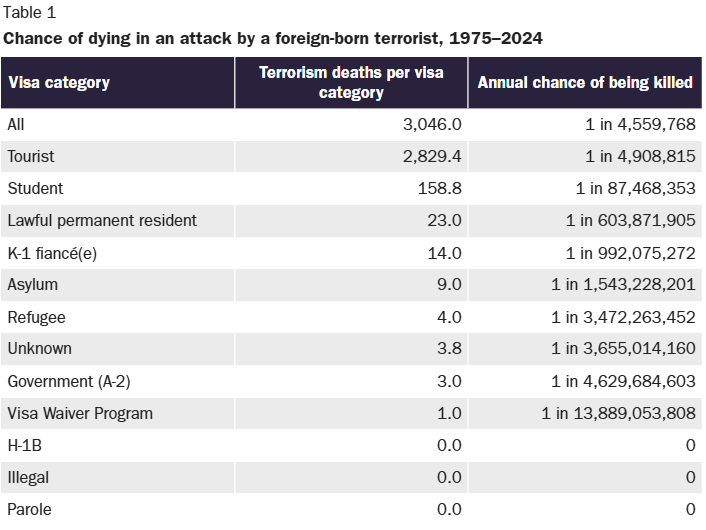Trump Practically Bans Travel and Immigration from 12 Countries Based on Flimsy Security Justifications
Travel ban déjà vu
President Trump announced that he’s banning almost all travel and immigration from Afghanistan, Burma, Chad, the Republic of Congo, Equatorial Guinea, Eritrea, Haiti, Iran, Libya, Somalia, Sudan, and Yemen for “terrorism-related and public-safety risks.” There are some exceptions for adoptions, immediate family members of US citizens, and a handful of other visas. A single terrorist from those countries murdered one person in an attack on US soil: Emanuel Kidega Samson from Sudan, who committed an attack motivated by anti-white animus in 2017. The annual chance of being murdered by a terrorist from one of the banned countries from 1975 to the end of 2024 was about 1 in 13.9 billion per year.
Trump’s announcement comes after Mohamed Soliman, an Egyptian who entered on a tourist visa, attacked a group of Jewish protesters in Colorado with a makeshift flamethrower. Egypt isn't on the list of banned countries, though. Another curious omission is Syria. Perhaps foreign relations are more important in determining which countries are on the list instead of actual security? It’s fruitless to speculate about the specific countries omitted or included on the list because the government has not released its report on visa security.
Trump also restricted travel from Burundi, Cuba, Laos, Sierra Leone, Togo, Turkmenistan, and Venezuela, albeit less severely than from the dozen countries above. Terrorists from those countries murdered five people in attacks on US soil since 1975, the last one in 1980. Cuban terrorists were the only perpetrators of attackers during that period who murdered people in their attacks.
The threat of foreign-born terrorism on US soil is above zero but also small and manageable without further government interventions. The government spends much more on anti-terrorism activities than would pass a cost-benefit test. The last person murdered in an attack committed by a foreign-born terrorist was in 2019 when Saudi-born Mohammed Saeed Alshamrani murdered three in a shooting at the Pensacola Naval Air Station. He was here on a visa training with the US military. Zero Americans were murdered in attacks on US soil committed when President Biden was in office, the first administration in my data set not to have a single American die in such an attack.
Trump also justified the country-level travel and immigration restrictions to prevent immigrant criminality on the assumption that travelers and immigrants from those countries are serious sources of crime. According to the US Census and American Community Survey Data, travelers and immigrants from the dozen banned countries have a nationwide incarceration rate of 370 per 100,000 in 2023 for the 18-54 aged population – 70 percent below that of native-born Americans. Their incarceration rate is about 16 percent higher than for all legal immigrants and 40 percent below all illegal immigrants. The incarceration rate for the visa-restricted countries of Burundi, Cuba, Laos, Sierra Leone, Togo, Turkmenistan, and Venezuela was almost identical at 369 per 100,000.
The United States government has a responsibility to keep terrorists and criminals out of the country and to remove those who make it through. However, the government should pursue a rational and evidence-based approach when evaluating the threat posed by foreign nationals. Otherwise, the government is wasting resources and impeding peaceful and voluntary exchange for no purpose. The Trump administration has banned large swaths of travelers and immigrants from many countries based on evidence that it likely won't release and, if it does, will likely raise more questions than answers. The threat of foreign-born terrorism and crime is manageable and small, especially from the countries facing new bans and restrictions by the administration.




110% agree.